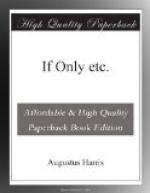He examined her thoroughly and replaced the stethoscope before he spoke.
“Your lungs are not right. They used to be.”
“Oh,” she replied bitterly, “I used to be. I have come too late—is that what you mean?”
“I mean that you must exercise great care and avoid excitement. Don’t brood—don’t worry yourself by misgivings, which will only do you harm. Go away from England when the summer is over; go where the sun shines and the air is mild. Lead a life of ease and indolence. I can say no more.”
“And then?”
“And then I see no reason why you should not live for years to come.”
Bella flung her hands out with a sort of despair.
“Your prescription is impossible,” she said dully.
“Impossible?”
“I have only just come over from the States. I have an engagement at the Empire for six months. I have got to stay.”
“You will be very unwise. The laws of health demand that you should cancel any such contract.”
“Beggars can’t be choosers. I must sing to live. It is my trade now.”
He sighed. “You do not look as if you were in pecuniary difficulties.”
“Well, I make money easily enough, but it melts like ice cream; everything is so beastly dear.”
“Are you not with—him?”
“Him? Oh no; he left me years ago. I am alone—very much alone. It seems sometimes as if I had spent the best part of my life alone. I am so dull I—I wonder why I dread to die. There! I can follow your advice so far as this; I’ll take the greatest care of myself—in London. I am glad I came to you, though it does not seem to have delighted you much. I suppose if—if I had run straight and stayed with you, I might have been quite well, eh?”
“That is difficult to say. Bella, have you—it is a foolish question, but—have you ever regretted?”
She laughed recklessly.
“Oh, as to that—what is the good of looking back, anyhow? I have and I haven’t—when I have been sick it has been awful lonesome. You didn’t grieve much, that’s certain. And you got your title soon after I went. It was lucky for you. Scot! I should have been Lady Chetwynd if I had stopped with you, wouldn’t I?”
“You would have been an honest woman.”
“Ah!” She rose from her chair and looked curiously round the room. “I remember those bronzes,” she said; “they used to hang in your little library in the old house. You are a good deal changed in the face; your manner is just the same. You were always a good fellow, I will say that. I know it better than I used to now I have had so—since I have been—”
“Hush—the past is dead. I was not so patient and tender with you as I should have been.”
“You saw that—you had made a mistake, but you tried to hide how sorry you were—I know you did that and I—well, I didn’t marry you to make you sorry. Do you know how we lived—he and I, when I left you? He took me to Paris; and didn’t we make the dollars spin, the pair of us—rather; and then one fine morning we heard a beastly bank had gone smash and he had lost pretty well all he had got.”




